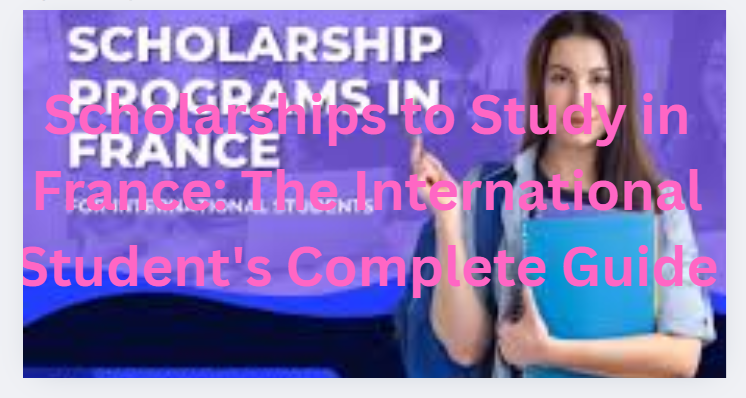
Imagine walking through the charming streets of Paris, stopping at a café between classes, then heading to your university in one of the world’s most beautiful countries—all while your education is funded by a scholarship that makes it financially possible. This isn’t just a dream scenario; it’s a reality for thousands of international students who discover France’s generous scholarship system each year.
I’ve guided students from over thirty countries through the process of securing funding for their French education, and I’m constantly surprised by how many talented individuals assume they can’t afford to study in France. The truth is quite the opposite: France offers some of the most accessible scholarship opportunities in Europe, often making it more affordable than studying in your home country.
Why France is a Scholarship Goldmine
What many prospective students don’t realize is that the French government actively invests in attracting international talent. Unlike countries where scholarships are scarce and fiercely competitive, France has structured multiple funding programs specifically for international students. This commitment stems from France’s desire to build global connections and share its culture and educational excellence.
The numbers speak for themselves: according to Campus France, over one in four international students in France receives some form of scholarship. This statistic surprises most people who assume European education is universally expensive. The reality is that France combines surprisingly low tuition fees (especially at public universities) with abundant scholarship opportunities.
Types of Scholarships Available
France offers scholarships at various levels and for different types of students. Understanding these categories is your first step toward identifying the right opportunities.
Government scholarships are the most prestigious and well-funded. The Eiffel Excellence Scholarship Program stands out as the flagship opportunity, providing recipients with €1,181 per month for master’s students and €1,700 for PhD candidates, plus additional benefits like international airfare and cultural activities. This fully-funded opportunity is highly competitive but life-changing for those who secure it.
University-specific scholarships are often less competitive than national programs. Nearly every French university offers some form of tuition reduction or living stipend for international students. These awards might cover partial tuition rather than full expenses, but they’re more accessible than many students realize.
Regional scholarships represent a hidden gem in the French funding landscape. Various French regions offer scholarships to attract international students to their specific areas. These often have fewer applicants because students focus only on Paris-based opportunities.
Private and corporate scholarships complete the picture. French companies and foundations frequently sponsor international students, particularly in fields like engineering, business, and technology where there’s high demand for skilled graduates.
The Application Process Demystified

The scholarship application process often intimidates students, but it becomes manageable when broken down into clear steps. Most applications require similar components, though specific requirements vary by program.
Your academic transcripts need official translation into French or English by a certified translator. I’ve seen excellent applications delayed because students used non-certified translation services. Invest in proper translation from the beginning.
The motivation letter makes or breaks applications. This isn’t a generic cover letter—it’s your opportunity to connect your past experiences with your future goals while demonstrating why France specifically fits into your academic journey. I always advise students to mention specific French professors they want to study with or particular university resources they plan to utilize.
Letters of recommendation require careful selection of referees. Choose professors or employers who can speak specifically about your abilities rather than those with impressive titles but limited knowledge of your work. Provide your referees with your motivation letter and CV to help them write detailed, supportive letters.
Timing Your Applications Perfectly
Scholarship deadlines in France follow a predictable annual cycle that many international students miss. Most applications for the following academic year open between October and January, with deadlines typically falling between January and April.
This timeline surprises students who start researching in the summer before they hope to study. The reality is that you need to begin preparing at least twelve months before your intended start date. I recommend creating a simple spreadsheet to track deadlines, requirements, and application status for each opportunity.
The Eiffel Scholarship typically has deadlines in early January, while university-specific scholarships often have later spring deadlines. Regional scholarships may have varying timelines, so careful tracking is essential.
Writing a Winning Motivation Letter
Having reviewed hundreds of motivation letters, I can immediately spot the ones that succeed. They share certain qualities that you can learn to incorporate into your own writing.
Successful letters tell a story rather than listing achievements. They connect the student’s background with their future ambitions while demonstrating genuine interest in French culture and education. I recently worked with a student who secured the Eiffel Scholarship by weaving her experience volunteering in her community with her desire to study social policy in France.
Specificity matters tremendously. Instead of saying “France has good universities,” mention particular research centers, professors, or programs that align with your goals. This demonstrates genuine interest rather than generic flattery.
Cultural awareness shows maturity. Mentioning how you’ve engaged with French language or culture—even at a basic level—signals your commitment to adapting to life in France.
Life as a Scholarship Student in France
Securing the scholarship is only the beginning. Understanding what comes next helps you make the most of your funded education.
The scholarship typically covers tuition and provides a monthly stipend for living expenses. In cities outside Paris, €800-€1,000 monthly is manageable, while Paris requires €1,200-€1,500. Budget carefully, as the stipend is designed to cover basic needs rather than luxury living.
Many scholarships include health insurance, which is crucial since France requires all residents to have coverage. Some programs also offer subsidized housing in university residences, significantly reducing your largest expense.
Scholarship students often have access to special networking events, language courses, and cultural activities. Take full advantage of these opportunities—they’re part of your educational experience and can lead to valuable connections.
Common Mistakes to Avoid
Through years of advising students, I’ve noticed patterns in unsuccessful applications. Avoiding these pitfalls significantly improves your chances.
The most common mistake is missing deadlines. Scholarship committees receive thousands of applications and rarely make exceptions for late submissions. Set multiple reminders for each deadline.
Generic applications fail because they don’t demonstrate why you’re the right fit for that specific scholarship. Tailor each application to the specific program rather than using a one-size-fits-all approach.
Poor language preparation undermines many otherwise strong applicants. While many programs are taught in English, basic French proficiency greatly enhances your daily life and shows commitment to integrating into French culture.
Underestimating living costs leads to financial stress. Research realistic expenses for your chosen city and create a detailed budget before accepting any scholarship.
Maximizing Your Scholarship Experience
Your scholarship is more than just funding—it’s an opportunity to fully immerse yourself in French academic and cultural life. Students who thrive are those who engage beyond the classroom.
Join student organizations related to your field. French universities have active student communities where you can build networks that may lead to internship or job opportunities.
Explore France beyond your university city. The country’s excellent train system makes weekend travel affordable, and experiencing different regions enriches your understanding of French culture.
Consider learning French intensively upon arrival. Many universities offer affordable language courses specifically for international students. This investment pays dividends throughout your stay and beyond.
Your Path Forward
The journey to securing a scholarship in France requires planning and effort, but the rewards extend far beyond financial support. You’re investing in an education that combines academic excellence with cultural immersion in one of the world’s most fascinating countries.
Start today by researching just one scholarship program. Tomorrow, you might draft the first paragraph of your motivation letter. Small, consistent actions build the momentum needed to turn this possibility into your reality.
France’s educational institutions await talented students like you. With the right approach and persistence, you could be among the next cohort of international scholars enjoying the life-changing experience of studying in France.
Frequently Asked Questions
Do I need to speak French to get a scholarship?
While many programs are taught in English, basic French proficiency strengthens your application. Some scholarships require French language skills, but many are available for English-taught programs.
Can I work while studying on a scholarship?
International students in France can work up to 964 hours per year (about 20 hours per week). Many scholarship students find part-time jobs in tutoring, hospitality, or campus positions.
What if my grades aren’t perfect?
Scholarship committees consider your entire profile, including work experience, extracurricular activities, and your motivation letter. Strong overall applications often succeed despite imperfect grades.
How competitive are French scholarships?
Prestigious scholarships like Eiffel are highly competitive, but university-specific awards often have better odds. Applying to multiple scholarships increases your chances significantly.
Can I bring my family with me on a student scholarship?
Students on scholarships can often bring family members, but you must demonstrate additional financial resources to support them. Check specific scholarship guidelines for family provisions.